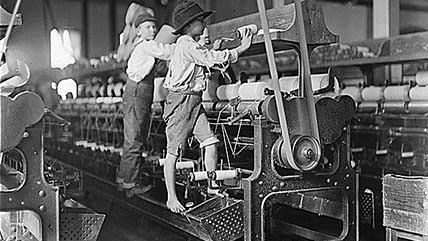Bolivia Lowers Legal Age of Employment to Help Poor Families

Bolivia has lowered its minimum age of employment from 14 to 10-years-old, giving it the distinction of being the nation with the lowest legal age of employment. But while the idea of tiny tots slaving away for payday may make some queasy, it's actually a positive step for one of the poorest countries in Latin America.
And the legislators in Bolivia recognize that:
The bill's sponsors say lowering the minimum work age from 14 simply acknowledges a reality: Many poor families in Bolivia have no other choice than for their kids to work.
However, the bill, they say, does offer working children safeguards.
"Child labor already exists in Bolivia, and it's difficult to fight it. Rather than persecute it, we want to protect the rights and guarantee the labor security of children," said Sen. Adolfo Mendoza, one of the bill's sponsors.
Under the legislation, 10-year-olds will be able to work as long as they are under parental supervision and also attend school. It sets 12 as the minimum age for a child to work under contract. Those children would also have to attend school.
Of course, not everyone views this as a positive step for the country and the kids. Before the bill became law, three organizations against the legislation sent a letter to Bolivia's president telling him not to sign the bill and pointing out that the country has signed treaties to the contrary. The letter argues:
If children as young as 12 are permitted to work, they will miss out on education during the very formative years of their development and risk being trapped in repetitive tasks, eroding their skills and prospective employability in future. In this process they would inadvertently enter into the vicious cycle of poverty and illiteracy which would not be easy to dismantle. Child labour as a double edged dagger could further deprive adults from decent working conditions because employers will always prefer children over adults for they do not demand minimum wages and cannot stand up for their rights.
These organizations may mean well, but they're missing one big point: banning child labor doesn't make it disappear. Nor does it miraculously pull families out of poverty and give them the opportunity to send their kids to school, as David Boaz of the Cato Institute points out:
If we say that the United States should abolish child labor in very poor countries, then what will happen to these children? … They're not suddenly going to go to the country day school. … They may be out selling their bodies on the street. That is not an improvement over working in a t-shirt factory.
In fact, when India banned employing children under the age of 14 in manufacturing, reasearchers found that child wages actually decreased and child labor increased.
In an ideal world, children would spend everyday learning, playing, and generally having the sort of childhood of Kevin Arnold in The Wonder Years. But we don't live an ideal world, and therefore goverments shouldn't take away a child's best alternative to poverty.


Show Comments (34)